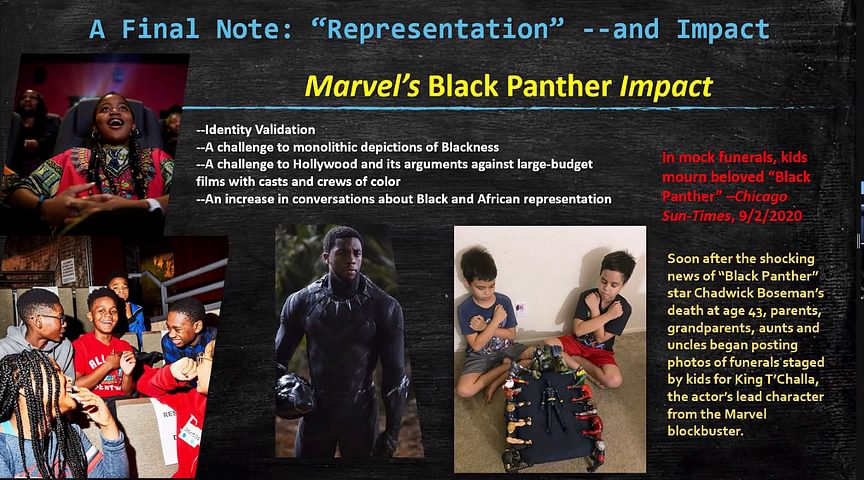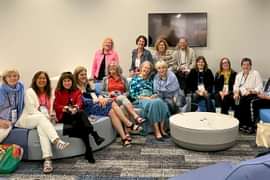January 28, 2021
MLK Day workshops in review
More than 400 community members continued to strengthen their understanding of civil rightsby Nancy Hitchcock
In keeping with tradition, the Phillips Academy community spent Monday, January 18—Martin Luther King Jr. Day—immersed in presentations and workshops that would honor MLK Jr.’s legacy of making progress toward an equitable and just society. More than 400 community members, including faculty, staff, administrators, alumni, and trustees, continued to strengthen their understanding of civil rights by attending presentations, including All-School Meeting featuring keynote speaker Charlene Carruthers, founding national director of Black Youth Project 100, and attending at least one of six workshops offered.
The programs—organized by the Equity and Inclusion Advisory Board and the Office of Community and Multicultural Development (CAMD)—helped deepen participants’ understanding of many issues including unconscious bias, critical race theory, environmental racism, and health disparities. Throughout each workshop, participants explored how they could be agents of change.
Here are a few highlights from the workshops and reflections on the day.

Strategies for the classroom
In the workshop “Because Black Lives Matter: A Cross-Media Approach to Anti-Racist Teaching,” Randy Testa, associate director in professional education at Harvard Graduate School of Education, reported that one approach to engage students is for educators to use digital technology and social media platforms to promote social, emotional, and academic development. He shared that media use by U.S. tweens for non-school-related activities is about five hours per day; for teens it’s more than seven hours per day, according to the 2019 Common Sense Media Census Report. And the main screen media activity for both tweens and teens is TV/watching videos.
Testa discussed how cross-media stories—stories that have crossed from one content platform (typically a book) to another platform (typically a movie)—can be used in anti-racist education. He provided examples from four cross-media stories: I Am Not Your Negro, The Hate U Give, Monster, and The Watsons Go to Birmingham.
Participants, including instructors in English, Spanish, and history, found the session informative and said it provided them with tools that would help advance conversations on anti-racism in the classroom and enrich their courses.
Midori Ishizuka, instructor in history and social science, said that the session reaffirmed her belief that an interdisciplinary, cross-media approach to teaching enhances critical thinking, reading, and writing skills. “Testa’s presentation and willingness to discuss further strategies for teaching media literacy and critical analysis afterward,” she said, “was invaluable to my personal and professional development.”
Testa discussed the term critical consciousness, which comes from Brazilian philosopher-educator Paulo Freire and refers to a person’s ability to recognize and analyze oppressive forces shaping society and to take action against these forces, and how this goal can be incorporated into education.
Instructor in and chair of English Stephanie Curci said: “I think that if one of our goals is critical consciousness (and that was a helpful reframe because it talks not just about the understanding of systems but also about the psychological health of the student), then using film and social media as a text feels important. It changes how I think about their use. And because I’m doing Watchmen and Black Panther next term, I have to figure out a way to include some of those visual texts.”
A challenge to take action
In another workshop, the two leaders—Latasha Boyd, associate director of college counseling, and Gina Finocchiaro, interim Protestant chaplain, introduced the concept of the “21-Day Equity Challenge.” They were excited to have 65 people sign up for the challenge, which invites participants to further their understanding of power, privilege, supremacy, oppression, and equity by committing to 21 days of action.
The participants were asked to engage in activities including videos, readings, podcasts, conversation prompts, and answer questions for reflection. Participants were also encouraged to keep a journal on their experience and will have the opportunity to share their reflections in small group conversations.
“A number of people have shared thoughtful responses and gratitude for the learning opportunities,” says Finocchiaro. “People have shared, already, that some of the lessons have invited them to think more deeply about topics presented and to shift their perspectives. We feel confident that the challenge is a success, thus far!”
Understanding Disparities in Health Care
In another presentation, “Social Determinants of Health, Health Disparities, and COVID-19,” Dr. Amy Patel presented slides that clearly illustrated the racial disparities in health care to about 145 participants. She also shared the YouTube video of Dr. Susan Moore who described the racist treatment she experienced in the hospital while sick with COVID-19, from which she ended up dying.
Clyfe Beckwith, senior advisor to the head of school, said the workshop was sobering in the way it detailed racial disparities. “The heart-wrenching video of Dr. Moore exposed the biases in care given to patients with COVID-19,” he said. “I’m proud of my colleague Dr. Patel for tirelessly working in all aspects of care to remove biases.”
Faculty, administrators, and staff appreciated the opportunity to participate in such thought-provoking sessions. They said they are empowered to incorporate what they learned on MLK Jr. Day into their personal and professional lives to make strides in improving racial equity.
“Many thanks to all who were involved in putting together this important day,” said Precourt Director of Partnerships Eric Roland. “I’m grateful for the many opportunities to be able to both learn and also take action.”
—Linda Griffith, Associate Head of School for Equity, Inclusion and Wellness
—Dr. Bridget Tsemo, Instructor in English
—Deb Olander, Instructor in Mathematics




